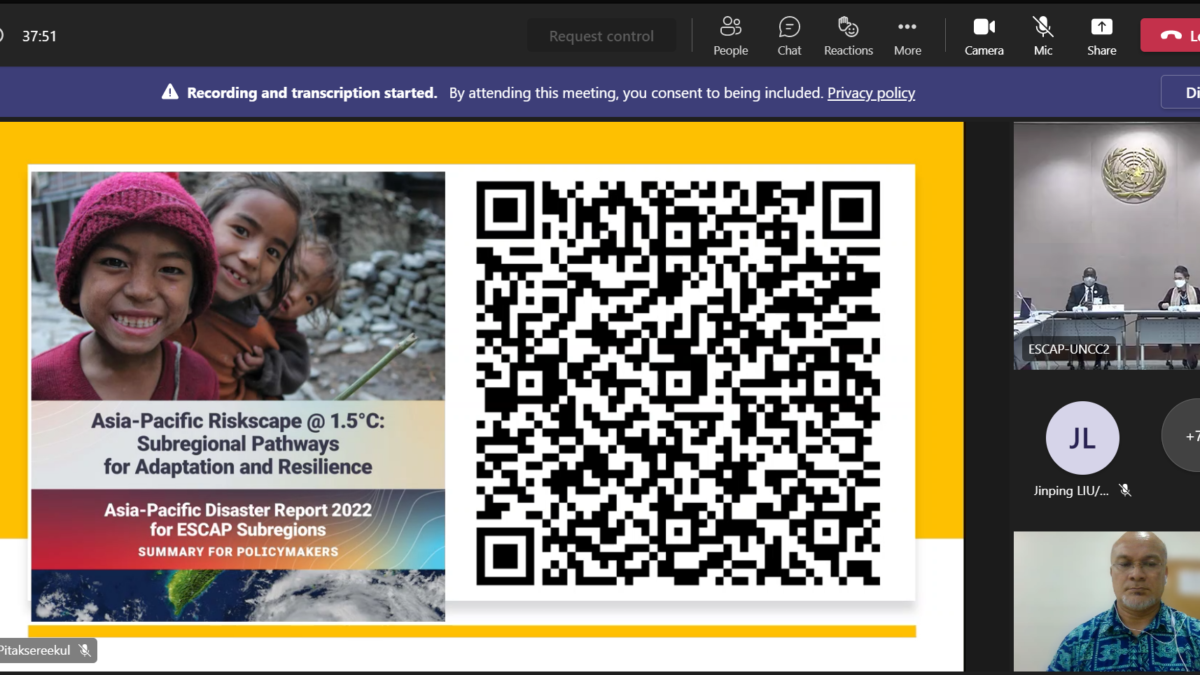PCRIC Expertise in High Demand
Recently, the CEO of the Pacific Catastrophe Risk Insurance Company (PCRIC), Mr. Aholotu Palu, was virtually attending the 7th session of the Global Platform (GP2022) on Disaster Risk Reduction when he was approached by the United Nations Economic and Social Commission for Asia and the Pacific (UNESCAP) to participate in a live side event… running at the same time.
A bit of schedule juggling allowed Mr. Palu to virtually participate at the UN Office for Disaster Risk Reduction (UNDRR) event in Bali, Indonesia and to also ‘pop-in’ to the (UNESCAP) side event hosted by the Maldives. The theme of this side event was “Sub-regional Pathways for Adaptation and Resilience.”
In his presentation, Mr. Palu, emphasised that, in all manners of resilience building, the focus must be based on the ‘principles of sustainability.’
He noted, “This is something so dear to me, as it calls for close and effective cooperation going forward. It should not only focus on providing funds but it should be accompanied by knowledge sharing programs via a platform that encourages the interchanging of knowledge and skills that can be contextualized in any given Pacific country.”
Building resilience through risk pooling should be a core tactic with climate change. Parametric insurance is one of the keys for each country’s ability to be prepared in advance and to respond immediately to help their citizens in times of disasters. It is a unique and innovative financial mechanism that will help increase the amount of available post-disaster funds while almost certainly also providing the far shortest timeframe to access funds from any potential international source.
Mr. Palu also shared that apart from PCRIC, there were 3 other risk pool facilities in the world: African Risk Capacity (ARC), Caribbean Catastrophe Risk Insurance Facility (CCRIF), and Southeast Asia Disaster Risk Insurance Facility (SEADRIF). These organisations have all grown to become an integral part of their region’s post-disaster planning.
However, he reminded delegates that, “there is no single financial or technical instrument, including what PCRIC offers that can independently address the risks that we face here in the Pacific.”
Mr. Palu then drew attention to the statement delivered by the Fiji Minister for Rural, Maritime Development and Disaster Management and Minister for Defence, National Security and Policing, Hon Inia Seruiratu, where he shared that, “the inadequate opportunities to accessible financing was a key element in delaying recovery commencement.”
The Hon Minister also said that, “Access to adequate finance early in the recovery, determines our ability to deliver on our recovery objectives and developmental plans. With the right support and access to finance, countries can indeed emerge stronger and more capable of seizing new opportunities. This access to finance is essential to protect the nation’s wellbeing and serves to shape the outcome of recovery initiatives in sustaining our blue economy.”
In response to this dual gap of ‘resources and delayed timing’, PCRIC’s role offers a significant benefit to island nations. PCRIC helps to ensure the enabling of rapid access to post-disaster funds when they are needed most. This supports relief efforts and thus helps to ensure a far quicker recovery.
Mr. Palu emphasised that, “We have to ask the question of what governments can do differently now to make resilience building a top priority of their development agenda. At the end of the day, political willingness is critical to strengthening financial protection in the face of climate and disaster risks in the region.”
He reiterated that government leaderships should understand their risks and develop mechanisms that enhance adaptation and that build resilience. An example is to diversify their financing options and assess the suitability of each financing instrument against the frequency and severity of the varied disaster risks that Pacific nations encounter.
“It is important to enhance technical and policy awareness at the regional and national levels. This would readily exhibit the comparative advantages of any mechanisms or instruments that are available to island countries that support resilience building. Regional gatherings like this favourably assist in enhancing the understanding of the relevance of existing instruments for countries to tap into,” Mr. Palu said.
PCRIC is at the ready to serve our Blue Pacific region.




